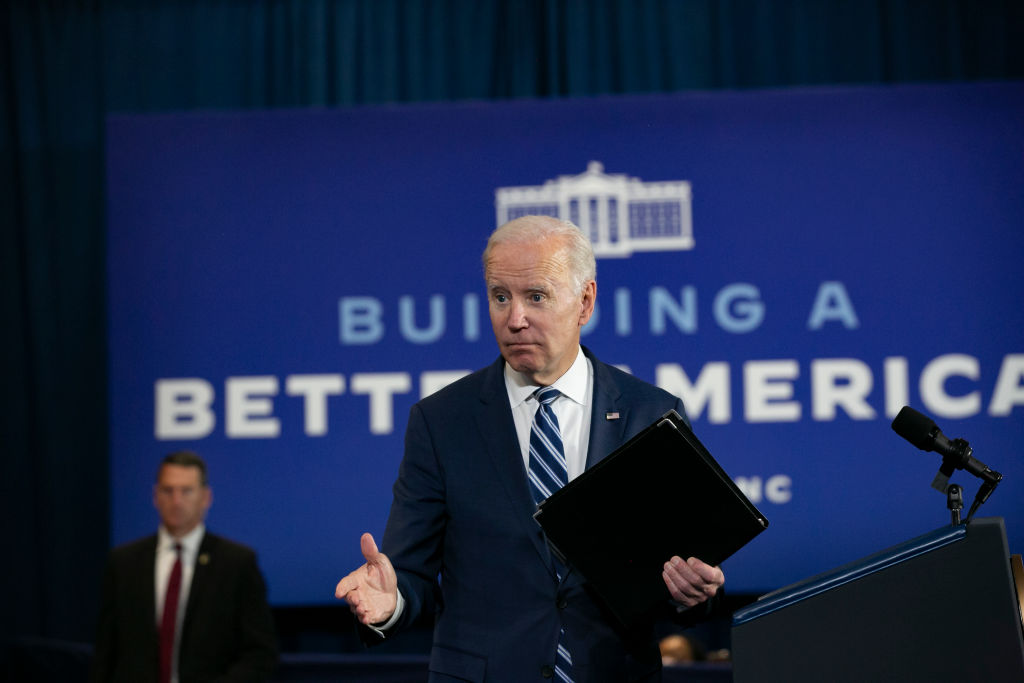Biden to again require agencies to consider projects' climate impacts, reversing Trump


A free daily email with the biggest news stories of the day – and the best features from TheWeek.com
You are now subscribed
Your newsletter sign-up was successful
The Biden administration will announce Tuesday that it is reinstating key pieces of a "landmark" environmental law requiring federal agencies to consider climate implications and speak with local communities before breaking ground on highways, pipelines, and other such projects, The New York Times and The Washington Post report.
In 2020, former President Donald Trump rolled back parts of 1970's National Environmental Policy Act's implementation to cut down on what he called "mountains and mountains of bureaucratic red tape." Under his changes, many projects were exempted from review and agencies skipped over considering so-called "indirect" climate impacts, the Post notes.
Per President Biden's changes, regulators must now consider how government actions contribute to greenhouse gas emissions, as well as how they burden communities — particularly poor and minority ones "that have already faced disproportionate amounts of pollution," the Post writes.
The Week
Escape your echo chamber. Get the facts behind the news, plus analysis from multiple perspectives.

Sign up for The Week's Free Newsletters
From our morning news briefing to a weekly Good News Newsletter, get the best of The Week delivered directly to your inbox.
From our morning news briefing to a weekly Good News Newsletter, get the best of The Week delivered directly to your inbox.
"Patching these holes in the environmental review process will help projects get built faster, be more resilient, and provide greater benefits to people who live nearby," Brenda Mallory, chair of the White House Council on Environmental Quality, said in a statement, per the Times. Critics of the law, however, are likely to argue it will conversely slow production and raise costs.
The decision arrives ahead of Earth Day on Friday, and as Biden's climate agenda continues its congressional struggle. High gas prices and the resulting push to boost oil production have also thrown a wrench in the president's environmental plans.
Officials have flagged that the updated rule will not have a large immediate impact considering the administration has already been considering the climate implications of its proposed projects. But it will "force future administrations to abide by the process or undertake a lengthy regulatory process and possibly legal challenges to again undo it," the Times writes.
A free daily email with the biggest news stories of the day – and the best features from TheWeek.com
Brigid Kennedy worked at The Week from 2021 to 2023 as a staff writer, junior editor and then story editor, with an interest in U.S. politics, the economy and the music industry.
-
 Political cartoons for February 16
Political cartoons for February 16Cartoons Monday’s political cartoons include President's Day, a valentine from the Epstein files, and more
-
 Regent Hong Kong: a tranquil haven with a prime waterfront spot
Regent Hong Kong: a tranquil haven with a prime waterfront spotThe Week Recommends The trendy hotel recently underwent an extensive two-year revamp
-
 The problem with diagnosing profound autism
The problem with diagnosing profound autismThe Explainer Experts are reconsidering the idea of autism as a spectrum, which could impact diagnoses and policy making for the condition
-
 How climate change is affecting Christmas
How climate change is affecting ChristmasThe Explainer There may be a slim chance of future white Christmases
-
 Blue Origin launches Mars probes in NASA debut
Blue Origin launches Mars probes in NASA debutSpeed Read The New Glenn rocket is carrying small twin spacecraft toward Mars as part of NASA’s Escapade mission
-
 Why scientists are attempting nuclear fusion
Why scientists are attempting nuclear fusionThe Explainer Harnessing the reaction that powers the stars could offer a potentially unlimited source of carbon-free energy, and the race is hotting up
-
 Dinosaurs were thriving before asteroid, study finds
Dinosaurs were thriving before asteroid, study findsSpeed Read The dinosaurs would not have gone extinct if not for the asteroid
-
 Canyons under the Antarctic have deep impacts
Canyons under the Antarctic have deep impactsUnder the radar Submarine canyons could be affecting the climate more than previously thought
-
 SpaceX breaks Starship losing streak in 10th test
SpaceX breaks Starship losing streak in 10th testspeed read The Starship rocket's test flight was largely successful, deploying eight dummy satellites during its hour in space
-
 NASA is moving away from tracking climate change
NASA is moving away from tracking climate changeThe Explainer Climate missions could be going dark
-
 Rabbits with 'horns' sighted across Colorado
Rabbits with 'horns' sighted across Coloradospeed read These creatures are infected with the 'mostly harmless' Shope papilloma virus
